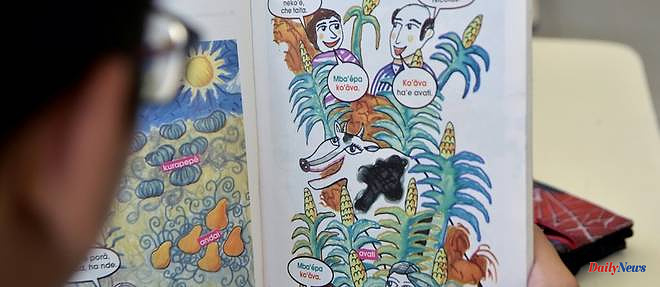In a Paraguay which votes for general elections on Sunday, Guarani, an official language like Spanish, spoken by almost everyone, has been able to constitute, beyond political divisions and inequalities, a factor of homogeneity. Not necessarily a guarantee of minority rights.
"Yaiko poraveta" ("we are going to be the best") proclaims the candidate of the Colorado (conservative) party in power, Santiago Pena. "Where jina" ("It comes" the change), replicate the slogans of his challenger, Efrain Alegre, at the head of a large center-left coalition, and close to shaking up the almost uninterrupted hegemony of Colorado for seven decades.
Five days before the election, in the campaign which is in full swing, Guarani is everywhere, Guarani is nowhere.
Contrast between the indigenous themes, very little visible in the countryside, and the dominant, almost natural place of an initially indigenous language which has become that of everyone, in this "little" Paraguay (7.5 million inhabitants but twice the size of Great Britain).
A "national" language since 1967 under the terms of the Constitution, then an "official" language alongside Spanish since 1992, Guarani has since been subject to compulsory education in schools, and since 2013 in acts of justice. And has its national holiday, May 25.
This survival of the language to colonization - and especially this country-wide adoption - owes a lot to... Jesuit missionaries (17th-18th century). "They played an essential role in the history of Guarani, by not teaching Spanish to the huge Guarani population under their leadership", explains historian Jorge Rubiani. And by translating religious texts into Guarani.
Before them, the advanced miscegenation of Paraguay also owed to the conquistador and governor Domingo Martinez de Irala (16th century), who had descendants with several Guarani women, and encouraged the colonists to do the same, with the aim of pacification.
"From the expulsion of the Jesuits in 1767, all this population mixed with the rest of the Paraguayan population, and in 1848 shortly after independence, the natives of the ex-missions were declared free Paraguayan citizens", continues- he. “Throughout this process, Guarani remains a language of communication”, without yet being “official”.
But the "single citizenship" then decreed was also the negation of a multi-ethnic reality, and the preamble to appropriations of land, discrimination, lasting injustices.
Still, at the margins, the Guarani language itself was left in peace, and for Jorge Rubiani, this largely explains its vitality to this day.
“Like a tree to which we would not have paid attention, and which would have bloomed, following its natural mechanisms”. And today plays "a very important role in the identity of the country".
"It is a paradox of Paraguay: the only country in Latin America that officially retains an indigenous language for the non-indigenous population. The sons and descendants of mestizaje have not wanted, over the years, to be considered Guaranis, but as Paraguayans", analyzes the anthropologist José Zanardini.
But for just under 2% of the population, some 117,000 members of indigenous communities (according to the 2022 census), belonging to nine distinct ethnic groups - among them Guarani - the historical trend persists, "to have wanted to make them invisible, erase them from the map,” laments Mr. Zanardini.
No party carrying "indigenous" demands in the campaign, no indigenous representation in Parliament.
But guarani, yes, everywhere, or "guarañol", the guarani-Spanish fusion in common usage.
Especially since according to linguists, Guarani is a rhythmic, sonorous language, at times with the false air of onomatopoeia, and which readily lends itself to "a direct, spontaneous, biting and explicit meaning", underlines the AFP Alberto Candia, specialist in this language.
Hence the pikes and names of birds in Guarani that fly in these last days of campaign between rival political camps, or in the street: "Iyapu ja imonda" (liar and thief), "Nane montavy" (he fools us) , "Eré ereva oyapo nande jegui" (They do what they want with us, the politicians")... And, in the press, this recurring call: "Yaja yavotà" (Let's go vote).
28/04/2023 08:06:57 - Asuncion (AFP) - © 2023 AFP












